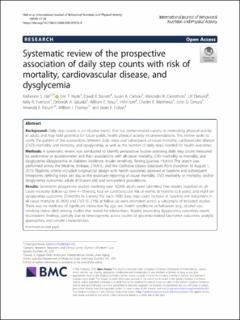Systematic review of the prospective association of daily step counts with risk of mortality, cardiovascular disease, and dysglycemia
Hall, Katherine S.; Hyde, Eric T.; Bassett, David R.; Carlson, Susan A.; Carnethon, Mercedes; Ekelund, Ulf; Evenson, Kelly R.; Galuska, Deborah A.; Kraus, William E.; Lee, I-Min; Matthews, Charles E.; Omura, John D.; Paluch, Amanda E.; Thomas, William; Fulton, Janet E.
Peer reviewed, Journal article
Published version
Permanent lenke
https://hdl.handle.net/11250/2731694Utgivelsesdato
2020Metadata
Vis full innførselSamlinger
- Artikler / Articles [2096]
- Publikasjoner fra Cristin [1084]
Originalversjon
International Journal of Behavioral Nutrition and Physical Activity. 2020, 17(2020), Artikkel 78. 10.1186/s12966-020-00978-9Sammendrag
Background: Daily step counts is an intuitive metric that has demonstrated success in motivating physical activity in adults and may hold potential for future public health physical activity recommendations. This review seeks to clarify the pattern of the associations between daily steps and subsequent all-cause mortality, cardiovascular disease (CVD) morbidity and mortality, and dysglycemia, as well as the number of daily steps needed for health outcomes.
Methods: A systematic review was conducted to identify prospective studies assessing daily step count measured by pedometer or accelerometer and their associations with all-cause mortality, CVD morbidity or mortality, and dysglycemia (dysglycemia or diabetes incidence, insulin sensitivity, fasting glucose, HbA1c). The search was performed across the Medline, Embase, CINAHL, and the Cochrane Library databases from inception to August 1, 2019. Eligibility criteria included longitudinal design with health outcomes assessed at baseline and subsequent timepoints; defining steps per day as the exposure; reporting all-cause mortality, CVD morbidity or mortality, and/or dysglycemia outcomes; adults ≥18 years old; and non-patient populations.
Results: Seventeen prospective studies involving over 30,000 adults were identified. Five studies reported on all-cause mortality (follow-up time 4–10 years), four on cardiovascular risk or events (6 months to 6 years), and eight on dysglycemia outcomes (3 months to 5 years). For each 1000 daily step count increase at baseline, risk reductions in all-cause mortality (6–36%) and CVD (5–21%) at follow-up were estimated across a subsample of included studies. There was no evidence of significant interaction by age, sex, health conditions or behaviors (e.g., alcohol use, smoking status, diet) among studies that tested for interactions. Studies examining dysglycemia outcomes report inconsistent findings, partially due to heterogeneity across studies of glycemia-related biomarker outcomes, analytic approaches, and sample characteristics.
Conclusions: Evidence from longitudinal data consistently demonstrated that walking an additional 1000 steps per day can help lower the risk of all-cause mortality, and CVD morbidity and mortality in adults, and that health benefits are present below 10,000 steps per day. However, the shape of the dose-response relation is not yet clear. Data are currently lacking to identify a specific minimum threshold of daily step counts needed to obtain overall health benefit.
Beskrivelse
This article is licensed under a Creative Commons Attribution 4.0 International License, which permits use, sharing, adaptation, distribution and reproduction in any medium or format, as long as you give appropriate credit to the original author(s) and the source, provide a link to the Creative Commons licence, and indicate if changes were made. The images or other third party material in this article are included in the article's Creative Commons licence, unless indicated otherwise in a credit line to the material. If material is not included in the article's Creative Commons licence and your intended use is not permitted by statutory regulation or exceeds the permitted use, you will need to obtain permission directly from the copyright holder. To view a copy of this licence, visit http://creativecommons.org/licenses/by/4.0/. The Creative Commons Public Domain Dedication waiver (http://creativecommons.org/publicdomain/zero/1.0/) applies to the data made available in this article, unless otherwise stated in a credit line to the data.
